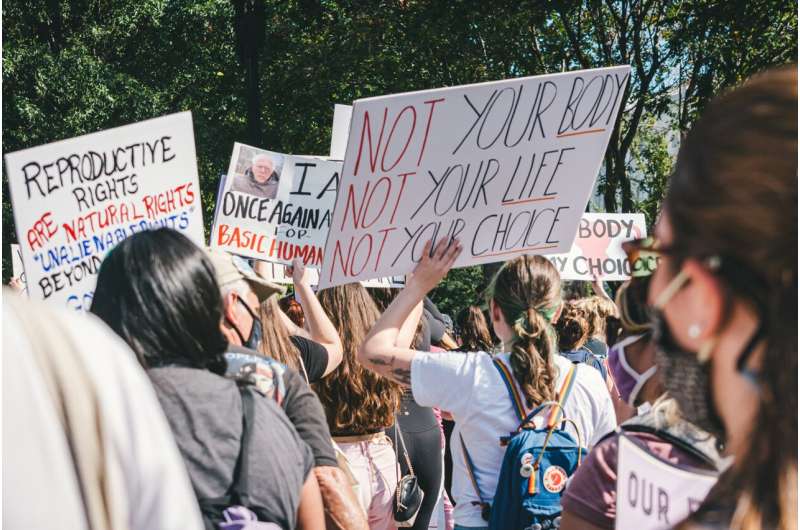Britney's conservatorship shows how the legacy of eugenics in the US continues to affect the lives of disabled women

Britney Spears has been locked in a court battle in the making. While her father was on Sep. 29, 2021, her conservatorship might not be terminated until the next hearing on Nov. 12.
During this conservatorship, she was limited in her ability to make everyday choices that most people take for granted.
One revelation that came out of was that she was not allowed to go off birth control.
"[T]his so-called team won't let me go to the doctor to take [my IUD] out because they don't want me to have children—any more children," Spears said.
Spears' anguish over the loss of her reproductive agency was palpable. And her story is one shared by disabled women across the country who are about their sexual and reproductive health.
Ensuring the reproductive rights of disabled women is a professional and personal issue for me. I am a at the University of Iowa studying the social factors that influence accessibility for disabled people. I am also a disabled woman who has faced tough decisions about my own sexual and reproductive health.
Disabled women, especially those with intellectual or developmental disabilities, are often trapped by . Courts and caregivers make choices about their lives with little input from the women themselves. Society because women with physical and mental disabilities are often seen as and in need of protection for their own good. But these beliefs come from the long shadow of eugenics and the stigma and stereotypes that continue to dominate conversations around disability and reproduction.
The long shadow of eugenics
The United States has a history of forced sterilization policies that targeted disabled people, women of color, and those living in poverty.
These policies arose from the , which permitted the sterilization of Carrie Bell, a young woman deemed "" by her adoptive family and, eventually, the Supreme Court. Buck v. Bell became a bellwether of the , which sought to eliminate "negative traits" through selective breeding. The ruling opened the door for an in the U.S. in the 20th century.
Buck v. Bell and the U.S. eugenics movement has affected both and . Today, the American Congress of Obstetricians and Gynecologists recognizes that disability is not a reason for sterilization, and that people should be able to make decisions about their own health as much as possible. However, this is only an , not enforced by robust public policy.
Stigma, stereotypes and reproductive agency
refers to the discrimination and exclusion that individuals or groups face when certain characteristics are labeled as undesirable. Disabled people often experience stigma because their bodies fall by society.
One way that against disabled women is that they are often stereotyped as . These stereotypes with health care providers, sex education teachers and others about access to . Disabled women also report because of these assumptions.
, or when an authority figure limits an individual's or group's freedom in what they perceive to be their best interests, also affects the sexual autonomy of disabled people. One way it manifests is through , a legal strategy that attempts to gauge whether a disabled person is capable of consenting to a sexual relationship.
While it is supposed to protect disabled people from sexual abuse, of sexual activity does not necessarily equate to protection. Disabled people are still at an of experiencing sexual abuse and violence regardless of their consent determination status. have revealed that they felt unable to report sexual abuse and that they lacked both social support and the ability to protect themselves.
Consent determination may also block access to sex education because it's deemed unnecessary. are risk factors for sexual abuse and violence. Disabled women are than their nondisabled peers to receive formal sex education; if they do, it is often long past when it's age-appropriate. For instance, one disabled woman deemed incapable of consent was informed by her high school that she was without being asked if she wanted to take the class.
Toward reproductive justice
Spears' conservatorship centered around the stereotype that disabled people are unable to manage their own lives. However, she had in this 13-year period. That she was still not allowed to act on her desire to have children is a testament to the enduring stigma around disability and especially .
Recognizing the reproductive rights of disabled women is about promoting reproductive justice for all women. This includes ending what one research subject called the "" around sterilization, supporting evidence-based , and fighting .
The disability rights slogan "" conveys that disabled people know what is best for them and should not be excluded from conversations about their own health. And this includes reproductive rights.
Provided by The Conversation
This article is republished from under a Creative Commons license. Read the .![]()

















